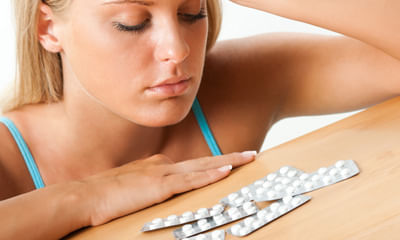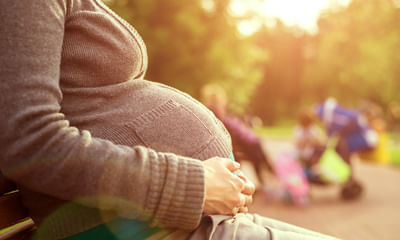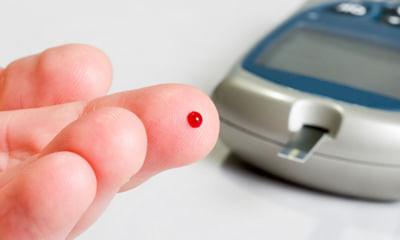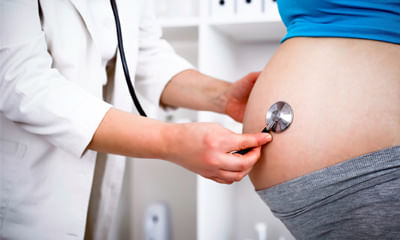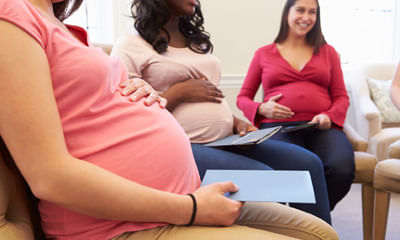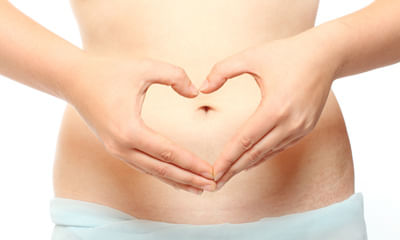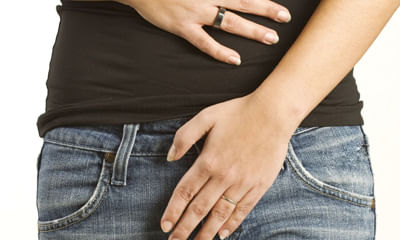Glucose In Urine During Pregnancy
I am having pcod but from last year my periods are regular but from september I did not came in periods .i had taken uri ...
Ask Free Question
You have not written your last period date. Urine Pregnancy test should be done 10 days after missing your period. For example if your date was 10th, then do the test on 20th. Before that it can give false negative or false positive test PCOD/PCOS is a common hormonal disorder in women which can lead to weight gain and irregular periods. While most women depend on pills to deal with it, these simple changes in your lifestyle will help you deal with the condition in a better way. 1. Nutritional approach: Deficiency of micronutrients contributes to insulin insensitivity and compromise ovarian function. So, •Completely stay away from processed/ refined cereals (which have a high glycemic index or GI). Switch to wheat, rice, jowar, ragi, barley (which have low GI) and enjoy your roti, parantha, pulao, biryani, dosa, poha, upma etc. •Eat an adequate amount of lean proteins like dal, milk, eggs, fish, yogurt, cheese, paneer, lassi, sprouted legumes. •Include good sources of omega-3 and omega-6 present in nuts, seeds, ghee, olives, coconut etc. Our body needs essential fatty acids for absorption of fat soluble vitamins like A, D, and E. •Alpha-lipoic acid improves glucose uptake in cells, promotes weight loss and improves the health of ovaries. It is found in flaxseeds, walnuts, spinach, broccoli, peas, Brussels sprouts etc. •Micronutrients like selenium, zinc, chromium, magnesium, niacin, and riboflavin improve sugar control and promote hormonal balance. These can be obtained from a variety of whole grains, nuts, green leaves, fresh fruits and veggies, egg, seafood etc. •Vitamin B12 is essential to support the function of ovaries. So include dairy (especially curd, paneer), eggs, seafood, and sprouted/fermented items. •Calcium in abundant supply helps to overcome premenstrual cramps. •Include supplements of above-mentioned nutrients as diet may not provide enough because their requirement is above normal. •Most importantly, eat local, seasonal, freshly prepared food items, stay away from food items that have long ingredient lists as they are 'processed' and have a number of additives (preservatives, artificial colors, flavor enhancers et al). 2. Exercise strategies: Regular workouts are non-negotiable. They are essential to burn off fat stores for hormonal balance and regular ovulation. A minimum of 150 minutes a week is recommended. Divide your time between strength training, cardio exercises and yoga for optimal results. Just like a diet, your exercise must be balanced too. 3. Sleep: Adequate sleep is non-negotiable too. Sleeping at a more or less fixed time every day and for an adequate number of hours is a prerequisite to keep hormones in sync. Also read: Lack Of Sleep May Reduce Fertility And Cause Weight Gain. Signs That You're Sleep Deprived 4. De-stress yourself: Love yourself more than anyone else, prioritize your health, learn to say no, take time out to exercise and relax. Pursue your favorite activities, learn a new skill, and never ignore your body signals. So, it's certainly possible to wean yourself off the pill and restore hormonal balance by implementing and adopting permanent lifestyle modifications. Wishing you all lots of patience, self-discipline and persistence as you endeavor to adopt these changes for good!
Asked for Female, 25 Years I have no children. One died during prenatal period, one aborted, one died after 3 months. Bo ...
Ask Free Question
Dear user. I can understand. Please don't be panic. I suggest you to consult a gynecologist in person. We are here to help you in every aspect of your mental and physical health. Any sexual or psychological problems can be cured with the help of various methods and therapies. I suggest you to post your query with every detail here. We will help you in overcoming your problems certainly. Take care.
Hi I am 27 weeks pregnant. I am done with my OGCT test today. It has values Fasting -90 1 hour - 152 2 hours - 134 with ...
Ask Free Question
126 mg/dL) are diagnostic of diabetes. A 1 hour GTT (Glucose Tolerance Test) glucose level below 10 mmol/L (180 mg/dL) is considered normal." mednames="">Fasting levels between 6.1 and 7.0 mmol/L (110 and 125 mg/dL) are borderline ("impaired fasting glycaemia"), and fasting levels repeatedly at or above 7.0 mmol/L (>126 mg/dL) are diagnostic of diabetes. A 1 hour GTT (Glucose Tolerance Test) glucose level below 10 mmol/L (180 mg/dL) is considered normal.
Sir I have checked my blood sugar and result was before eating anything (fasting blood glucose) =105& after eating (PP b ...
Ask Free Question
Yes, your sugar levels are normal Frequent urination can be a symptom of many different problems from kidney disease to simply drinking too much fluid. When frequent urination is accompanied by fever, an urgent need to urinate, and pain or discomfort in the abdomen, you may have a urinary tract infection. Other possible causes of frequent urination include: Diabetes. Frequent urination with an abnormally large amount of urine is often an early symptom of both type 1 and type 2 diabetes as the body tries to rid itself of unused glucose through the urine. Pregnancy. From the early weeks of pregnancy the growing uterus places pressure on the bladder, causing frequent urination. Prostate problems. An enlarged prostate can press against the urethra (the tube that carries urine out the body) and block the flow of urine. This causes the bladder wall to become irritable. The bladder begins to contract even when it contains small amounts of urine, causing more frequent urination. Interstitial cystitis. This condition of unknown cause is characterized by pain in the bladder and pelvic region. Often, symptoms include an urgent and/or frequent need to urinate.
I am 33 year old and into 28th week of my second pregnancy. This week I went for 2.5 hours GTT and some other routine te ...
Ask Free Question
lybrate-user ji, Thanks for the query. The reference values for OGTT during pregnancy are like as shown:" According to these criteria the diagnosis of GDM is made if there is at least one abnormal value (≥92, 180 and 153 mg/dl for fasting, one-hour and two-hour plasma glucose concentration respectively), after a 75 g oral glucose tolerance test (OGTT: From those it is clear that your OGTT values after 1 hour and 2 hours are higher, suggesting presence of GDM (Gestational diabetes). It is necessary to maintain glucose values between 90 to 120 mg through out the day, for having a healthy baby, to prevent large baby and to get the desired outcome of pregnancy. So there is a need for looking at your diet and also there may be a need for Insulin injections to achieve lower glucose levels, till the completion of pregnancy. Thanks.
Blood sugar is 177 in the 20th week of pregnancy, HbA1c is 5.24,and sugar in urine is present +++.What does it mean plea ...
Ask Free Question
Hello, Thanks for the query. Please get an Oral Glucose Tolerance Test (OGTT) done with 75 g of glucose and then look at the glucose levels, that will give a clear picture whether you have gestational diabetes. If it is present then there is a need to start appropriate treatment preferably with Insulin injection. Glucose levels have to be maintained between 90 to 120 mg all through out the day. Fasting glucose has to be < 92 mg and 2 hour should be < 153 mg. If you have any doubts please do come back. It is essential to achieve a strict glucose control. Otherwise it would affect the fetal growth and outcome of the pregnancy. Thanks.
Before rushing to clinical test, we got something on the Google that, if you dissolve sugar in morning urine (first one, ...
Ask Free Question
Please note that Google is not the authority to diagnose or give medical advise. It is simply a search engine which reflects whatever people feed into it. Even though it shows all kinds of views (both truth and false news ), one needs to be alert and use common sense before leaping to final judgements. Therefore it is essential that one should not take any information seriously without cross-checking the facts with the right authority. The best wayout is to go for regular health check up (personal examination by a doctor) and seek advise. You can also take a second opinion if you are not satisfied or convinced with the doctor's advise.
Took 2 hr GTT in the 5th month of my pregnancy (last week). The following is the result Glucose (F) -80 Glucose (1 hr) - ...
Ask Free Question
Repeat urine sample. Stop eating sweets and decrease the intake of sugar or sugary products. Though GTT is normal, but it's always good to take care.
At the time me and my husband have sex I'm getting Soo much pain. Can you help me why. ...
Ask Free Question
Dyspareunia is a term used for pain felt in the genital area or pelvis during or after having sex (intercourse). Nobody really knows exactly how common it is, as many women never seek medical help. However, questionnaires asking women if they have symptoms suggest that somewhere between 1 and 4 out of 10 women experience it. Most commonly, this is early in their sexual lives or around the menopause. There are many causes of dyspareunia, most of which are not serious or damaging in nature, but all can be detrimental to your sex life and ultimately may lead to relationship difficulties. It can be a vicious circle, with pain leading to nervousness about having sex, and nervousness leading to dryness and further pain. It's also not uncommon for dyspareunia to remain after the cause has been treated, particularly if things have been left untreated for a while. For this reason, it is important to seek help early, so that treatable causes can be discovered and managed. This leaflet discusses the types and possible causes of dyspareunia. What is dyspareunia? Dyspareunia is pain felt in the genital area or pelvis during or after having sex (intercourse). It may be thought of as either superficial dyspareunia or deep dyspareunia. They have different causes and treatments and, although it's possible to experience both at the same time, most women find that their dyspareunia is predominantly one or the other type. Superficial dyspareunia This is pain felt in the lips of the vagina (labia), at the vaginal entrance (introitus) and the lower part of the vagina. It typically begins with penetration or very early on after intercourse has begun. It is sore and instant. It is usually quickly relieved by stopping penetration, although you may be sore to the touch afterwards for a little while. The causes of superficial dyspareunia are usually local problems of the labial, vaginal and perineal skin (the perineum is the area of skin between the vaginal opening and the back passage). Deep dyspareunia This is the term for pain felt deeper in the pelvis during or after intercourse. It can also spread to involve the fronts of the thighs. It may be sharp or dull, may stop when penetration stops or can continue for minutes or even hours. The causes of this type of pain usually lie rather deeper in the pelvis. Causes of superficial dyspareunia Skin bridge Formation of a little bridge of scar tissue at the very back of the vaginal entrance (introitus) is common after childbirth, particularly if you have had a cut between the vagina and back passage (anus) - a procedure called episiotomy. The scar tissue contains nerve endings and is very sensitive, and so it causes pain on penetration. The pain tends to become worse as having sex (intercourse) continues, as the skin bridge becomes rubbed by the continuing rubbing of penetration. Intact hymen The hymen is a membrane that lines the vaginal opening. Early in your sex life the hymen is broken down by the act of having sex. In many young women it will already have been stretched by use of tampons. The name 'intact hymen' is misleading, as the hymen does in fact have a small hole in it from birth. This hole becomes larger little by little as girls grow older. However, the hymen can be quite thick and the hole not quite large enough. This can mean that early in her sexual life a woman my feel pain from the hymen as it is forced open the first time she has intercourse. The pain is superficial, felt at the entrance to the vagina as soon as penetration is attempted and may prevent it from taking place. Vaginismus Vaginismus causes a powerful and often painful contraction of the muscles around the entrance to the vagina, which makes penetration painful or impossible. It may also prevent the use of tampons and any sort of gynaecological examination. The spasm of vaginismus is not something you can cause deliberately; it's completely outside your control. It may seem to begin for no reason but can also result from a painful or worrying experience of sex, when it becomes a kind of protective reflex. However, vaginismus is upsetting and dispiriting for both halves of a couple, as it can prevent the enjoyment of sex for many years and can prevent sex completely. Once it has begun, fear of failure and nervousness about not being able to have sex make it worse. It's important to seek help to break the cycle of anxiety and pain. Vaginismus is not difficult to treat but your doctor may need to refer you to a psychologist or specialist physiotherapist. Bartholinitis Bartholin's glands are a pair of glands on either side of the vagina, in the tissues of the wall. They can become inflamed and tender causing Bartholinitis and this will lead to pain during sex. Occasionally, the glands swell during sex, so that it starts off as painless but then becomes painful as it continues. See separate leaflet called Bartholin's Cyst and Abscess for more details. Vulvodynia This is a very troublesome condition where the vulval area becomes painful and extremely sensitive to pressure and touch. It can be accompanied by severe pain on attempted penetration. It can also cause the vulval area to be painful touched and during activities of everyday living. It can lead to frustration and depression, as symptoms can be very long-standing. The causes are uncertain but may involve the nerves in the area becoming much more sensitive than normal and the way the brain communicates wtih these nerves changing in some way. Treatment includes the use of emollient soap substitutes, creams that numb the area, medicines that lessen pain, physiotherapy and cognitive behavioural therapy. Lichen sclerosus This is a scarring skin condition which may affect women of any age, including children. It can affect men too. It results in thinning of the skin of the genital area, together with formation of white patches. It may be caused by the immune system. It causes itching and pain, which can last for a very long time. It's often mistaken for thrush as it can be very itchy and sometimes slightly sore. Lichen sclerosus carries a small risk risk of cancer of the genital skin. For this reason it should be diagnosed and treated - treatment is usually with regular application of creams. See separate leaflet called Lichen Sclerosus for more details. Female genital mutilation Female genital mutilation (which used to be known as female circumcision), involves varying degrees of mutilating surgery to the genitals of a girl. In the more extreme forms, the vagina is stitched shut. Following genital mutilation there is usually permanent scarring, which may lead to damaged nerves and pain. Any of these issues can cause pain on penetration and may make sex impossible. Vaginal abnormalities Very rarely, abnormalities of the vagina itself make sex painful or even impossible. These include pieces of extra tissue inside the vagina which are present at birth (vaginal septa). Causes of superficial and deep dyspareunia Vaginal trauma The vagina is pretty flexible and strong and usually recovers well from the stretch and (sometimes) small tears of childbirth. However, more significant injury to the vagina - for example, from difficult childbirth or mutilation - can lead to scarring and then to pain and difficulty during sex (intercourse). Vaginal or genital infection Infections of the vagina and the area around it cause inflammation of the tissues and so commonly cause pain on having sex. Infection may be with thrush (candida - a yeast that often lives in the bowel), with viruses such as herpes and with germs (bacteria). A wide range of bacterial infections can infect the vagina. Some (but by no means all) are sexually transmitted. The vagina is not always sore and itchy before sex but becomes so afterwards. There is often a coloured discharge and you may notice an offensive smell. See separate leaflets called Vaginal Thrush (Yeast Infection), Genital Herpes and Bacterial Vaginosis for more details. Vaginal dryness Sometimes pain during sex is due to lack of lubrication, meaning that the vagina is too dry. Normally, the vagina produces secretions which keep it moist and these increase when you become sexually aroused. If there isn't enough foreplay, or you are not aroused enough, you may not produce enough secretions to make penetration comfortable. However, it isn't always as simple as that. There may be reasons why you don't produce the secretions that you should. These can include psychological reasons such as nervousness because sex has previously been uncomfortable; anxiety around becoming pregnant; or anxiety around waking your sleeping children. Dryness can also be for physical reasons - the vagina tends to be drier after the menopause (see below). Some medicines can cause vaginal dryness, including some contraceptive methods. Vaginal dryness is also associated with a condition called Sjögren's syndrome, in which the body's secretions are generally rather reduced. Finally, pregnancy itself can make the vagina dry during intercourse (although it can also have the opposite effect). Vaginal atrophy After the menopause the levels of hormones in your body fall - particularly the level of oestrogen. Oestrogen is the hormone that keeps the vaginal wall strong and resistant. It increases the blood supply and the level of secretions and makes the wall softer and more stretchy. Therefore, when oestrogen levels fall after the menopause, the tissues become thinner, less stretchy and less well lubricated. Sometimes they can become as fragile and delicate as the vaginal tissues of young girls (who have not yet reached puberty and started their periods). There are lots of very effective treatments for this problem. See separate leaflet called Vaginal Dryness (Atrophic Vaginitis) for more details. Causes of deep dyspareunia Deep dyspareunia can be caused by the genital organs themselves but may also be caused by other structures in the tummy (abdomen) that can be easily knocked during sex (intercourse). There are therefore many possible causes of deep pain in the tummy during sex. Cervical pain The neck of the womb (cervix) should not normally be painful. However, if can become infected by many of the organisms which can infect the vagina - particularly herpes. If the cervix becomes inflamed then knocking it with the penis during sex may cause deep pain in the pelvis and sometimes across the fronts of the thighs. The cervix may also become tender and sensitive if you have an intrauterine contraceptive device, particularly if it is sitting a little too low or falling out. This can cause sudden sharp pains in the cervix during sex. (Fortunately cervical cancer is very rare and does not usually cause painful sex.) Endometriosis Endometriosis is a condition in which little bits of womb (uterine) lining become embedded in other parts of the body. Most usually this is in the ovaries, the Fallopian tubes that link the womb to the ovaries, and the cervix. These bits of tissue bleed whenever you have a period. This blood tends to cause scar tissue formation with sticking of organs to one another, and the whole pelvis can become painful. Endometriosis is typically found in young women, and may only become apparent when they come off the contraceptive pill if they have been taking it for a while. This is because 'the pill' suppresses it and is, in fact, a treatment for endometriosis. Endometriosis causes pain on sex, typically pain that comes on with deep penetration and continues for some time after penetration is over. It also causes painful periods, and women with endometriosis can find it difficult to get pregnant. See separate leaflet called Endometriosis for more details. Ovarian cysts The presence of cysts on the ovaries can cause pain during sex (intercourse). This is because the ovaries can be knocked by the penis during intercourse and this can cause the cysts to leak fluid. It's not unusual to have cysts on the ovaries, as cyst formation is a normal part of the period (menstrual) cycle. However, these 'physiological cysts' are typically very small. Larger cysts are more likely to leak and cause pain, and can be a sign of endometriosis, especially in younger women. In women who have passed their menopause, ovarian cysts are worrying, as they can be a sign of ovarian cancer. See separate leaflet called Ovarian Cyst. Another, harmless form of pain from the ovary is called 'Mittelschmerz. This is pain when an egg is released from the ovary. Pain from Mittelschmerz may not be related to sex at all, and typically lasts for two or three days in the middle of the month - but sex may make it worse when it's there. Fibroids and growths in the womb Fibroids are non-cancerous (benign) growths in the muscle of the womb, which can cause the womb itself to become quite bulky. This is not always painful but it can lead to discomfort during sex. See separate leaflet called Fibroids. Causes related to womb position In some women the womb tilts backwards, rather than forwards; the ovaries then tend to fall backwards too. This can lead to them being knocked in positions involving deep penetration. This can result in deep pain in the pelvis that is more noticeable with deep penetration and which settles slowly when penetration stops or when you change your position. Bowel pain During intercourse the bowel is also knocked and moved. If the bowel is sensitive or tender then this can be the origin of pain during sex. This is particularly likely in women who have Crohn's disease, ulcerative colitis or irritable bowel syndrome, all of which are conditions that cause the bowel to be painful. See separate leaflets called Irritable Bowel Syndrome, Crohn's Disease and Ulcerative Colitis. Pelvic inflammatory disease This is a condition of the Fallopian tubes, the womb and, sometimes, the ovaries. It is caused by infection and makes these organs inflamed. As they tend to move during sex, this is painful. The pain is typically felt deep in the pelvis, is worse with deep penetration and settles slowly when penetration stops. Pelvic inflammatory disease also tends to make you feel unwell, and may cause a temperature and a vaginal discharge. See separate leaflet called Pelvic Inflammatory Disease. Bladder pain The bladder sits on top of your womb, just behind and above your pubic bone. Like the womb, the bladder moves and gets pressed on during intercourse. So, if the bladder is inflamed, this may hurt. Typical causes include urine infections and interstitial cystitis. This is a condition in which the bladder becomes sensitive and painful. It behaves like a urine infection but no infection is present. Summary Symptoms of dyspareunia (pain felt in the pelvis during or after sex) are distressing and depressing. They can affect your sex life, your fertility and even your relationship. Many of the causes have a very simple solution and it is important to seek help if you are experiencing problems.
I have urine test results PHYSICAL EXAMINATION Quantity 25 ml Color Pale Yellow Clarity Clear CHEMICAL EXAMINATION Gluco ...
Ask Free Question
Respected Bhavna hi candida is not known to give rise to either amniotic fluid leakage or pregnancy loss Dear thanks regards

